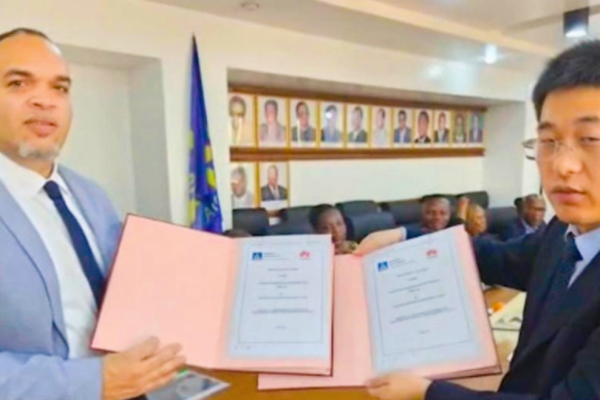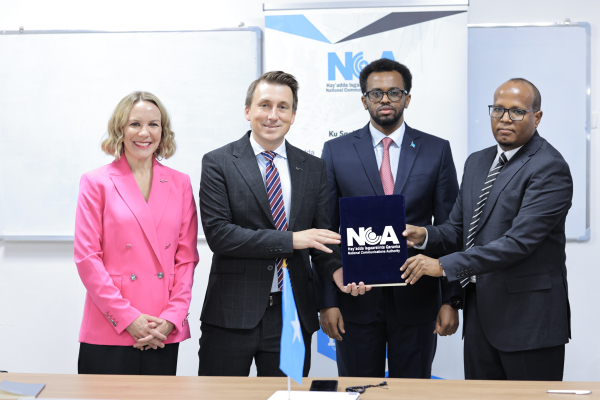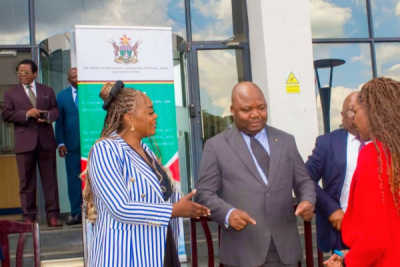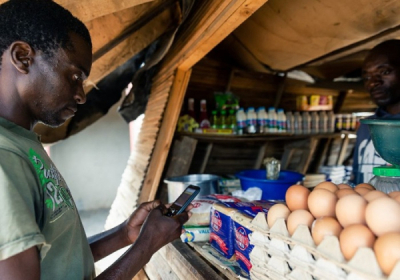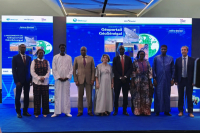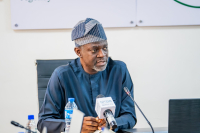• DR Congo's SNEL signs MoU with Huawei to digitize national power services
• Agreement covers fiber optic expansion, smart meter deployment, and digital infrastructure upgrades
• Focus areas include smart substations, digital sales points, data centers, and monitoring systems
The Democratic Republic of Congo's national electricity company, SNEL, has signed, on Thursday, a memorandum of understanding with Chinese technology firm Huawei to digitally transform the country's power services.
The partnership, as reported by the Congolese News Agency, focuses on four key areas: expanding fiber optic network capacity and coverage to improve nationwide connectivity; modernizing electricity distribution infrastructure with smart meters, digital sales points, and communication systems for field teams; developing high-performance data centers and implementing monitoring systems for transmission lines and transformer substations; and deploying smart substations and innovative distribution cabinets with value-added digital services.
The agreement aligns with President Felix Antoine Tshisekedi's vision to modernize the country's strategic infrastructure and supports the National Digital Plan Horizon 2025, which aims to strengthen the Congolese public sector's technical and digital capabilities. As the plan's deadline approaches, authorities are accelerating efforts to digitize state-owned enterprises, improve service quality, and enhance transparency.
This partnership underscores the growing interest of technology companies, particularly Chinese firms, in the Congolese market, where Huawei is steadily expanding its presence through significant infrastructure projects.
By focusing on fiber optic network expansion, smart meter deployment, and the development of digital infrastructure such as data centers, the initiative aims to enable smarter and more efficient electricity management. It could also facilitate real-time decision-making, improve service transparency, and lay the groundwork for a more connected energy ecosystem.
Samira Njoya
- Somalia grants operating license to Starlink to expand internet access
- Service aims to improve rural connectivity using low-Earth orbit satellites
Somalia's National Communications Authority (NCA) announced Sunday it has granted an operating license to Starlink, the satellite internet service owned by Elon Musk's SpaceX, aiming to expand internet access, particularly in underserved rural areas.
The NCA believes Starlink's entry will significantly improve connectivity across the country.
"Starlink's entry into Somalia represents a significant milestone in our efforts to bridge the digital divide," said Mustafa Yasin Sheikh, Director General of the NCA, during the license signing ceremony. "This partnership will especially benefit individuals and institutions in rural areas, where internet access has been extremely limited."
Starlink uses a network of low-Earth orbit satellites to deliver internet services, a technology aligned with the GSM Association's (GSMA) recommendations for achieving universal connectivity in sub-Saharan Africa. The GSMA notes that the region's challenging terrain, including rainforests, deserts, and mountains, hinders the deployment of traditional terrestrial networks. "Even in rural and sparsely populated areas, the cost and complexity of deploying traditional mobile or wired networks reinforce the need for alternative connectivity solutions," the GSMA said.
According to the International Telecommunication Union (ITU), nearly half of Somalia's approximately 18.4 million people lacked 4G network coverage in 2023. While 3G and 2G technologies reached 80% and 90% of the population, respectively, the country's overall internet penetration rate stood at only 27.6%.
The potential impact of Starlink on Somalia's digital divide hinges on its affordability. Although specific Somali pricing has not been disclosed, neighboring Kenya offers a potential benchmark: a standard monthly subscription costs 6,500 Kenyan shillings (roughly $50), with a connection kit priced at 49,900 shillings.
If Somalia's pricing mirrors Kenya's, the service could be prohibitively expensive for many Somalis. The $50 monthly fee exceeds Somalia's monthly gross national income (GNI) per capita, estimated at $49.1 by the World Bank. The ITU recommends that monthly internet service expenditures should not exceed 2% of GNI per capita. Currently, Somalis spend an average of 5.3% of per capita GNI on mobile voice and internet services, and up to 80% for fixed internet.
By Isaac K. Kassouwi,
Editing by Sèna D. B. de Sodji
- The Program was developed with financial services provider Sofac
- It offers installment payments starting at 110 MAD (~$12) over up to 36 months
- Customers apply in-store via app with approvals processed within 30 minutes
Samsung Electronics' Moroccan subsidiary has launched a consumer credit solution, "Samsung Finance+," aimed at boosting sales by making its products, particularly smartphones, more accessible to local consumers.
Developed in partnership with Sofac, a specialized financial services provider, the program allows customers to purchase Samsung products through installment payments. Monthly payments start at 110 Moroccan dirhams (approximately $12), with financing periods extending up to 36 months.
Customers can apply for financing directly in-store via a dedicated application, with Sofac advisors processing applications within 30 minutes. Upon approval, customers can take their chosen Samsung smartphone home immediately.
"We are delighted to launch Samsung Finance+ in Morocco in collaboration with SOFAC," said Hyun Joong Kim, President of Samsung Electronics Maghreb Arab (Semag), in a statement. "This service will enable a greater number of Moroccan consumers to access our innovative products. It marks a significant step towards making Samsung technology more accessible."
The initiative aligns with Samsung's broader strategy to strengthen its presence in the Moroccan market while adapting to local consumers' purchasing power. By partnering with Sofac, Samsung leverages local expertise in consumer credit.
The African smartphone market is facing headwinds. Research firm Canalys reported that Samsung's smartphone shipments to the continent fell 17% in the fourth quarter of 2024 compared to the previous year, totaling 3.5 million units. With a 17% market share during that period, trailing Chinese firm Transsion's 49%, Samsung is seeking to maintain its competitiveness amid softening demand.
Samsung may replicate the consumer credit model in other African markets to bolster growth, using Morocco as a pilot program in a region where upfront payments often present a significant barrier to purchase.
However, access to credit remains contingent on Sofac's assessment of a customer's financial profile, potentially excluding consumers in the informal sector or those without established banking histories. This screening process could impede the broader inclusion goals of such financing solutions.
By Adoni Conrad Quenum,
Editing by Feriol Bewa
Côte d'Ivoire’s La Poste and China’s Caftrade launch GO'POST green mobility and logistics project Initiative includes electric ride-hailing, eco-friendly express delivery, and mobile payments Pilot phase to deploy 100 electric cars and 200 electric motorcycles.
Côte d'Ivoire’s national postal services operator, La Poste, and Chinese digital logistics firm Caftrade, signed a partnership on Tuesday, April 8, to launch GO'POST, an integrated green mobility and logistics solution. Presented at a ceremony led by Digital Transition and Digitalization Minister Kalil Ibrahim Konaté, the initiative combines electric ride-hailing, eco-friendly express delivery, and digital services to modernize urban transport while addressing environmental concerns.
"The launch of GO'POST illustrates the government’s commitment to making digital technology a driver for modernizing the administration, fostering economic and social inclusion, and serving as a growth engine for young entrepreneurs. We are implementing the President of the Republic’s directives regarding the modernization of La Poste, in order to offer services that contribute to digital inclusion, as evidenced by this initiative," stated Konaté.
The project centers on three key components: electric ride-hailing passenger transport, eco-friendly express delivery for individuals and businesses, and an interoperable mobile payment solution. The pilot phase will deploy 100 electric cars and 200 electric motorcycles, preceding a nationwide rollout.
This initiative coincides with the continent's growing energy and digital transition. Africa's electric vehicle market is rapidly expanding. A Mordor Intelligence study values it at $15.8 billion in 2024, projecting it to reach $25.4 billion by 2029, with a 10.2% average annual growth rate. This momentum reflects increasing awareness of environmental issues and a commitment to sustainable and smart solutions, particularly in urban transport and connected services.
The launch of GO'POST is expected to significantly impact Côte d’Ivoire’s economic and social landscape. Beyond reducing pollutant emissions, the project aims to create new "green" jobs, support digital entrepreneurship, and enhance financial inclusion through accessible mobile payment solutions. By integrating technology with mobility, the initiative paves the way for a more resilient, sustainable, and inclusive ecosystem.
Samira Njoya
- Zimbabwe launches digital skills program with UAE support to train 1.5 million citizens
- The initiative focuses on programming, AI, data science, and Android development in Kotlin
- Part of Zimbabwe's digital transformation strategy through 2030, it aims to address ICT skill gaps
Zimbabwe's government, with support from the United Arab Emirates, launched a program on Thursday, April 10, to train 1.5 million citizens in programming, aiming to establish "the foundations for a future-focused Zimbabwean workforce skilled in cutting-edge technologies."
The "Zimbabwe Digital Skills Program" will equip participants with key competencies, including data science, programming, Android development in Kotlin, and artificial intelligence.
This initiative aligns with the Zimbabwean government's digital transformation strategy through 2030, which prioritizes skills development and digital capacity building as one of its three core pillars. The government identified a shortage of ICT skills and low digital literacy as significant obstacles to the information and communication technology sector.
"Zimbabwe has a high literacy level and should leverage on this to become a software and hardware development hub. The Government of Zimbabwe intends to increase innovation through promoting local content, heritage and culture applications development," according to the government's master plan.
In August 2024, the government established ties with LinkedIn, focusing on digital skills acquisition for civil servants and youth, particularly through the "LinkedIn Learning" platform.
These initiatives aim to address youth unemployment, a pressing issue for the country. According to the World Bank, approximately 61% of Zimbabwe's population is under 25. However, the country faces high levels of unemployment and underemployment, with a youth unemployment rate of 35% in 2021. The World Bank also estimates that nearly 230 million jobs in sub-Saharan Africa will require digital skills by 2030.
By Isaac K. Kassouwi,
Editing by Sèna D. B. de Sodji
To challenge international neobanks, Solimi has launched a mobile app in Togo, emphasizing ease of use, secure transactions, and its established position within the country's financial ecosystem.
Lomé-based fintech Solimi has launched Gnim, a mobile application designed for comprehensive digital management of personal finances and online payments in Togo. Developed by Matina Gaël Egbidi and launched in 2020, Gnim offers users a fully digital account, instant virtual Visa card issuance, and advanced financial tracking tools.
The application features automatic expense categorization, real-time balance checks, dynamic transaction history generation, and secure online and in-store payment services. Users can create an account and manage their finances directly from their smartphones, facilitating online and in-store purchases, transfers, and budget tracking. Gnim is available on iOS and Android, with over 10,000 downloads on the Play Store.
Solimi aims to bolster financial inclusion and reduce Togolese reliance on foreign financial platforms. The app emphasizes a streamlined user experience, an intuitive interface, and compatibility with major payment channels to attract a young, digitally connected demographic.
However, the startup faces a competitive Togolese fintech market, where widespread adoption hinges on user trust, service reliability, and strategic local partnerships. Notably, Gnim competes with established players such as the super app Gozem, MiaPay, and eGo Transfer.
By Adoni Conrad Quenum,
Editing by Feriol Bewa
- Senegal launches National Geoportal to expand access to geospatial data
- Platform supports territorial governance, transparency, and public data accessibility
- Offers geospatial data for sectors including agriculture, environment, infrastructure, and public services
The Senegalese government officially launched the National Geoportal on Tuesday, April 8, in Dakar, aiming to democratize access to geospatial data for improved territorial governance, transparency, innovation, and inclusive public data management.
"Digital transformation is no longer a choice—it is a necessity. Geospatial data must now be accessible in real time, not only to expert communities but also to citizens and entrepreneurs in their daily activities. By fully integrating geospatial data into the digital dynamic, the State is building a more agile, more efficient administration, firmly focused on citizens," said Isidore Diouf, Director General of Sénégal Numérique SA.
The platform was developed under the National Geomatics Plan (PNG) and the SEN Spatial project, with support from technical partners, including the French Embassy. It provides geospatial data across key sectors such as agriculture and food security, the blue economy, basic social services, environment and biodiversity, and infrastructure and spatial planning. The portal also offers information on geomatics activities and training.
This initiative aligns with the Technological New Deal, Senegal's digital strategy, which prioritizes modernizing the public information system. Sénégal Numérique SA, the lead entity in implementing the national digital policy, has deployed its technical infrastructure to ensure the resilience, availability, and security of data on the GeoSenegal platform.
Senegal intends to establish integrated digital governance through this initiative, with territorial data playing a crucial role alongside strategic frameworks like digital identity. This move follows the recent launch of Senegal’s first satellite, GAINDESAT-1A, designed for Earth observation and enhancing territorial management capabilities. The overarching goal is to strengthen inter-institutional coordination and accelerate the digitization of public services.
By Samira Njoya,
Editing by Sèna D. B. de Sodji
Ghana is accelerating its economy-wide digital transformation. In December 2024, the government initiated a review of its education ICT policy to modernize it and address current sector challenges.
Ghana's Minister of Lands and Natural Resources, Emmanuel Armah-Kofi Buah, emphasized the necessity of digitizing land resource management for increased efficiency during an April 8 visit to the Lands Commission. The $165 million initiative seeks to overhaul a system deemed slow, complex, and vulnerable.
"With my interactions with management of the Commission earlier this morning, I was told that 90% of the Commission’s work is manual. The current system is too slow, cumbersome, and vulnerable. And I believe that digitising the system will speed up surveying and mapping processes, help in locating land quickly, reduce paperwork, and ultimately boost government revenue mobilisation efforts," Buah stated.
The Food and Agriculture Organization of the United Nations (FAO) supports this initiative, asserting that responsible digital transformation of land administration systems can yield substantial benefits. It could invigorate land markets, enhance government land-related revenue, and stimulate economic growth through innovation. It would also strengthen transparency and equity among stakeholders, thus mitigating corruption risks.
This land resource digitization aligns with the Ghanaian government's broader objective to leverage digital technologies for economic growth, public service modernization, and equitable access to digital tools. Digitalization projects are also underway in sectors like education.
However, the $165 million funding requirement poses a potential obstacle to the transformation's implementation. "The infrastructure can be largely invisible, taken for granted, or simply not understood by key decision-makers. To be sustainably maintained, LAS demand systematic, unified, and durable digital transformation plans, that align with each country’s priorities," notes the FAO's 2022 report, "Funding digital transformation of land administration."
By Isaac K. Kassouwi,
Editing by Sèna D. B. de Sodji
- Benin approves digital public procurement system to streamline procedures and improve transparency
- System aims to simplify contract awarding, enhance fairness, and reduce opacity in bidding processes
Benin's government approved the implementation of a digital public procurement system in a Council of Ministers meeting on Wednesday, April 9, aiming to streamline procedures, enhance contract awarding efficiency, and ensure greater transparency in public contract allocations. Revised public procurement regulations will support the new system, with relevant ministers tasked to guarantee its effective application.
"Beyond the irrefutable advantages of technological evolution, the digitalization of public procurement will generate significant gains and progress beneficial to both bidders and contracting authorities," the Council of Ministers stated.
The move aligns with Benin's broader digital transformation efforts. Since 2016, over 1,000 public services have been digitized, with 210 fully dematerialized, allowing citizens to complete administrative tasks online. The Ministry of Digital Affairs and Digitalization has allocated 29.03 billion CFA francs (approximately $48.6 million) for 2025, a 19.3% increase from 2024, to support these modernization initiatives. Further sector modernizations are expected in the coming months.
The digital procurement system is projected to strengthen transparency, simplify processes, and mitigate opaque practices. By automating procedures and centralizing data, it will facilitate bidder access to information, ensure equal treatment among candidates, and reduce ambiguity in bid evaluations. This approach may also shorten procurement timelines, improve decision traceability, and generate budgetary savings. Ultimately, it should enhance contracting authority accountability and foster an environment conducive to investment and competitiveness.
By Samira Njoya,
Editing by Sèna D. B. de Sodji
The National Information Technology Development Agency (NITDA) has officially inaugurated the Local Organising Committee (LOC) for the upcoming GITEX Nigeria 2025, marking a key milestone in the country’s tech advancement journey.
The formation of the LOC is a strategic step toward hosting Nigeria’s first-ever edition of GITEX, a globally recognized tech exhibition and conference. The event aims to catalyze innovation, attract investments, and elevate Nigeria’s standing in the global digital economy.
With preparations now underway, GITEX Nigeria 2025 promises to be a landmark platform for showcasing local innovation and connecting Nigeria’s tech ecosystem with global players.
More...
The commitment is significant because it addresses one of Africa’s most persistent challenges: lack of access to affordable and inclusive financial services.
The Agence française de développement (AFD), which advances France’s policy on sustainable investment and international solidarity, has announced an additional €3 million commitment to the Africa Digital Financial Inclusion Facility (ADFI). The move, announced on April 9, aims to accelerate access to financial services for underserved populations across the continent. This brings AFD’s total contribution to ADFI to over €5 million.
“Developing digital financial services is a key pathway to reach financially excluded populations in Africa,” said Audrey Brule-Françoise, Head of AFD’s Financial Systems Division. “This new contribution will help scale up impactful and inclusive solutions.”
The fresh injection of funds will support scalable digital financial solutions that enable access to credit, savings, and other services essential for investment and entrepreneurship—particularly among women, youth, small businesses, and rural communities.
ADFI, managed by the African Development Bank (AfDB), was launched in 2019 as a collaborative effort between AfDB, AFD, the Bill & Melinda Gates Foundation, and the Government of Luxembourg. France’s Ministry for the Economy, Finance and Industrial and Digital Sovereignty, the Women’s Enterprise Finance Initiative (We-Fi), and India’s Ministry of Finance later joined as partners, further strengthening the initiative’s global backing.
Despite progress in mobile money and fintech innovation, close to half of Africa’s adult population remains excluded from digital financial services. World Bank data shows that in Sub-Saharan Africa, account ownership has more than doubled since 2011, reaching 49 percent in 2021-22. Yet, disparities remain stark—ranging from just 6 percent in South Sudan to 91 percent in Mauritius—highlighting the vast potential to expand financial inclusion through the digitalization of payments.
ADFI aims to bridge this gap through investments in digital infrastructure, supportive regulation, and product innovation, with a strong focus on gender inclusion and capacity building.
With over 2,700 projects in 115 countries, AFD continues to play a central role in supporting sustainable development and financial inclusion, reinforcing France’s global commitment to the Sustainable Development Goals.
Hikmatu Bilali
With its stated aim being to streamline Morocco's used car market, the startup is rebuilding the buying and selling process with reliable services tailored to individuals and professionals.
Kifal Auto, a Moroccan startup's e-commerce platform, facilitates the online purchase, sale, and rental of used cars across multiple cities in the country. Founded in 2019 by Nizar Abdallaoui Maane and based in Casablanca, the company was acquired in 2022 by Autochek, a Nigeria-based automotive technology firm expanding into North Africa.
The platform offers comprehensive client support, including mechanical inspections, vehicle valuations, and administrative procedure management. Vehicles undergo a stringent 200-point expert inspection, ensuring they are in sound condition. Users, whether buying or selling, have access to all necessary data to secure favorable transactions.
Kifal Auto operates in numerous Moroccan cities, including Casablanca, Fez, Rabat, Tangier, Agadir, and Marrakech. The platform features a broad selection of car brands, spanning Japanese, German, and American models.
Additionally, the startup provides car rental services, allowing customers to select new vehicles and benefit from flexible contracts ranging from 12 to 60 months, with fixed monthly payments covering all services for streamlined driving.
Kifal also offers financing solutions through partnerships with financial institutions, enabling buyers to make affordable monthly payments. Users can thus purchase vehicles on credit or leverage various financing options.
By Adoni Conrad Quenum,
Editing by Feriol Bewa
Senegal, with backing from the United Arab Emirates, plans to digitize its daaras, the traditional Quranic schools that educate thousands of children nationwide. A meeting held in Dakar on Monday, April 7, between Senegal’s Minister of National Education, Moustapha Mamba Guirassy, and a delegation from Abu Dhabi-based digital education firm Alef Education, advanced this initiative.
"Fruitful discussions laid the groundwork for a strong partnership, with a pilot phase set to begin in October 2025. The objective is clear: to build a digital education model rooted in our cultural and spiritual values, and capable of equipping daaras with 21st-century teaching tools," the Ministry of National Education said in a press release.
This initiative follows President Bassirou Diomaye Faye’s visit to Alef Education’s headquarters in the United Arab Emirates, where he established the foundation for the collaboration. It falls under the government’s "Senegal Daara Digital Transformation" project, which in its initial phase aims to deploy an artificial intelligence-powered personalized learning platform targeting over 10,000 students. The curriculum will include Arabic, mathematics, and Islamic studies.
Daaras are an important component of Senegal’s education system. According to a 2018 survey by the NGO Global Solidarity Initiative (GSI), there are more than 2,000 such schools across the country. This partnership is expected to create new educational opportunities. Alef Education, known for its expertise in educational technologies, is poised to play a central role in this transformation, providing students with modern digital tools while respecting the cultural and spiritual distinctiveness of the daaras.
By Samira Njoya,
Editing by Sèna D. B. de Sodji
Unilever South Africa, the British High Commission, and global professional services organization EY have awarded over R9 million ($455,832.39) in funding to four South African startups tackling plastic waste.
The support, announced by Unilever South Africa on April 7, includes tailored mentorship and business development assistance under the Transform South Africa initiative, which promotes sustainable solutions and community development.
This new cohort joins previous Transform-supported ventures like Oxfam South Africa’s Social Factory, Imagineif, and Loowatt. Together, they form part of a global movement across 17 countries, bringing scalable, inclusive solutions to millions.


